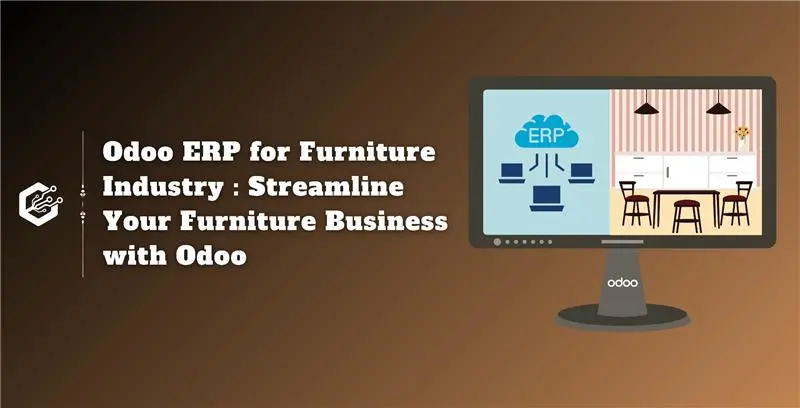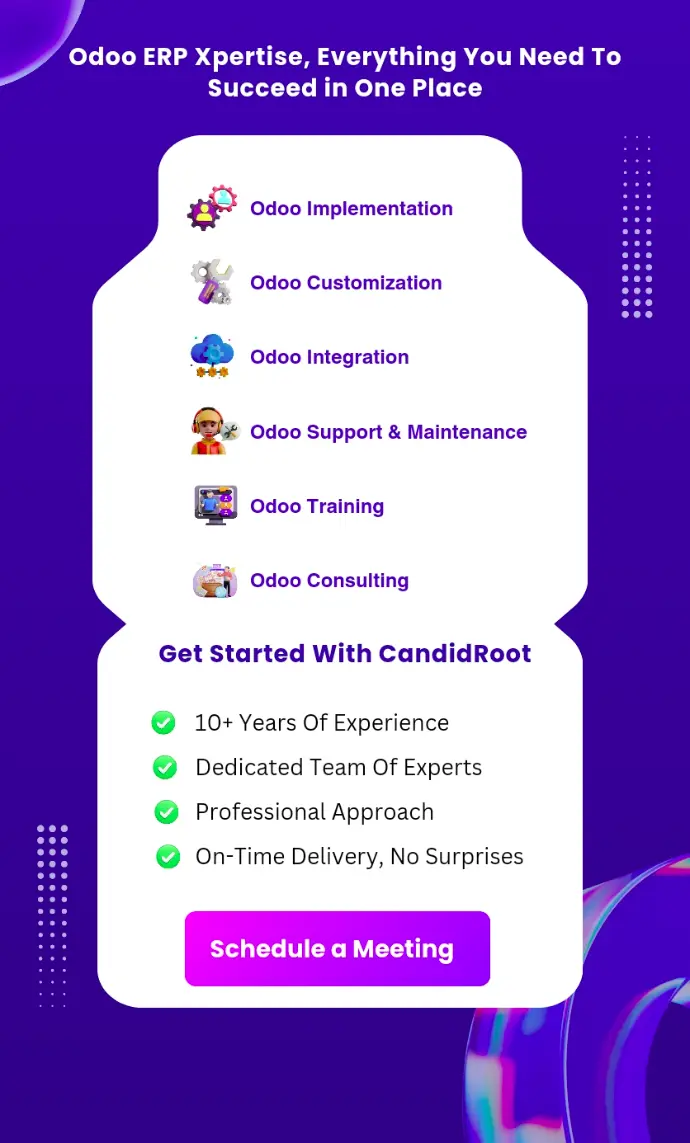It can be hard to manage raw materials, monitor product phases, fulfill delivery dates, and adjust to customer demands all at the same time. These can frustrate even the most experienced furniture manufacturers. The constant pressure to personalize products, minimize waste, and deliver within tight timeframes usually leads to mistakes, delays, and missed opportunities.
Odoo ERP for Furniture Industry has a smarter solution to manage such issues. Centralized data, automated processes, and real-time insights maintain the smooth functioning of the operations and get the teams coordinated.
Furniture companies can get rid of guesswork, minimize manual intervention, and react immediately to trends. New and small businesses gain the adaptability they need to grow smoothly and stay organized. This post shows how ERP helps with order, efficiency, and control over your furniture manufacturing industry.
Don't miss to check : ERP for manufacturing industry and ERP for logistics industry
What is an ERP for Furniture Manufacturing?
An ERP for the furniture industry is a software solution. It was developed to address the unique demands of furniture manufacturing companies, which integrates all business activities and data into a single system. This provides companies with one source of information and complete visibility into their operations. Daily operations become easier to automate and improve accuracy, enabling teams to deal with more tasks effectively.
This ERP caters to all such activities, such as order management, inventory management, supply chain operations, product planning, and customer relationship management. Odoo ERP for Furniture Industry is one of the numerous solutions available. It offers a multitude of business functionalities that span sales, manufacturing, accounting, billing, and e-commerce. The open-source nature of the software enables furniture manufacturers to tailor features according to operational objectives and business organization.
Challenges Faced by the Furniture Industry
Dynamic Customer Preferences
Changing business needs is the biggest challenge in the furniture manufacturing industry. In the modern days of personalization, constant changes in customer demands are usual. Monitoring these changes, implementing them efficiently, and being able to provide timely delivery are daunting tasks.
Not keeping up with changing expectations affects customer loyalty and satisfaction. High customer satisfaction is directly related to the capacity to address changing needs, and it also provides a better opportunity for long-term customer retention for furniture manufacturers.
Raw Material Lead Times
Production lead time is the total span needed to carry out a task from its initiation to its end. The time span between ordering materials and their arrival is another key measure. The length of lead time for raw material halts the entire production process.
Production delay, higher holding cost, low customer satisfaction, and supply chain disruption become important issues, and raw material lead times pose a challenge for furniture makers who seek easy and timely operations.
Balancing Inventory Management
Seasonality in the furniture business complicates inventory management. Businesses need to balance fulfilling continuous customer needs without stocking excessively during peak-off seasons. Dealing with a broad array of furniture products comes with another dimension of complexity.
Companies need to carry sufficient quantities of popular items while not carrying too many less popular items. Neglecting this can result in stock shortages or excessive storage expenditure, making effective inventory management essential for sustenance and customer satisfaction.
Resource Wastage
Furniture producers often source their basic materials from multiple international suppliers. Getting the right quantity and standard of supplies is crucial. In the absence of proper management and traceability systems, it is difficult to track inventory.
Such is usually followed by over-purchasing and holding excessive inventories, which leads to avoidable financial loss. Poor traceability and control of inventory increase the risk of wastage, and therefore, resource management is a major issue that directly affects the operational efficiency and cost-effectiveness of the company.
How Does Odoo ERP for the Furniture Industry Help Overcome These Challenges?
Customer Relationship Management (CRM)
Odoo CRM simplifies customer interactions and nurtures relationships. This is done by bringing together information like customer information, orders, and preferences. It assists furniture companies in following up on leads, closing opportunities, and offering after-sales services from a single location. Communication becomes smooth with built-in tools for handling customer conversations and internal communications.
Real-time sales analytics through a single dashboard enables teams to make better decisions. Acquiring and developing leads also becomes easier. This promotes customer satisfaction and loyalty and allows furniture manufacturers to better understand and meet the individual demands of every customer.
Product Lifecycle Management (PLM)
Odoo PLM centralizes the furniture product life cycle from design to delivery. This version-controlled module enables manufacturers to follow every step from concept initiation, design, and procurement of materials to production. It handles product variants, bills of materials, and revisions effectively.
The integrated enterprise social network facilitates cross-functional collaboration and seamless change management. Furniture businesses can minimize time-to-market, deliver consistent product quality, and address customer needs more effectively. The outcome is a more flexible and collaborative platform for managing product development and delivery across departments.
Inventory Management
Odoo inventory management offers instant tracking of both raw inputs and completed products. It avoids stockouts and overstocking by automatically generating smart alerts and reports. Items are accurately directed to specific storage areas based on tailored placement guidelines.
Advanced replenishment techniques such as MTO, min-max rules, and analyzing production schedules are employed by Odoo ERP for furniture manufacturer operations to maintain optimized stock levels. Goods are accurately placed in assigned storage zones based on specific placement strategies. This helps avoid human errors and supports a smooth production flow across every stage of inventory handling.
Multiple Warehouse Management
Odoo ERP provides unified control over several furniture warehouses. Businesses can track stock levels at multiple sites instantly using live tools. It helps companies manage inbound and outbound shipments with push and pull rules based on customization.
The rules plan inventory transfers between warehouses automatically, saving time and effort in tracking manually. Odoo’s inventory lookup displays precise product locations, making efficient use of space and quick fulfillment of orders. Manufacturers benefit from efficient warehouse coordination and enhanced logistics operations without having to toggle among various systems.
Supply Chain Management
Odoo ERP manages all aspects of the supply chain, from the procurement of materials to the end of shipping. Inventory, PLM, CRM, and accounting features enable effective coordination between vendors, manufacturing, and shipping.
Furniture businesses can track and regulate all phases of the supply chain, resulting in prompt delivery of products and improved customer service. It interlinks departments, provides visibility throughout operations, and avoids interruptions. Supply chain operations become more reliable and economical, directly helping to boost productivity and realign with customer needs.
Purchase Management
Odoo’s procurement module automates the complete purchasing procedure, from creating RFQs to receiving supplies. Furniture makers can smoothly handle changes in production and maintain strong partnerships with suppliers. Reordering rules enable the system to auto-create RFQs and purchase orders whenever stock levels decline.
Configurable purchase orders streamline supplier coordination. Automation shortens procurement time, increases accuracy, and ensures material availability without stoppages. This supports smooth production and enhances relations with suppliers, which is essential for meeting demand and preventing plant shutdowns.
Accounting Management
Odoo accounting management offers a range of finance-related features, including billing, bookkeeping, and additional tools. The accounting application is quick, entirely automated, and reduces manual intervention by using AI-based invoice data extraction. Businesses are able to handle finances directly from smartphones, keeping up to date with expenses and budgets.
The invoicing app has real-time tracking with detailed invoice management. Odoo Expenses keeps receipts submitted through mobile and email in order. Furniture manufacturers enjoy enhanced visibility into cash flows, fewer manual errors, and smarter financial decisions that drive operational efficiency and growth.
Quality Control and Compliance
Odoo Quality provides product consistency through regular quality inspections during production and stock operations. Quality standards can be established by furniture manufacturers to inspect and trigger alerts in case of any defect. These notifications help uncover the main issue and outline the actions needed to fix it.
Odoo ERP software for furniture industry enables regulatory compliance and minimizes returns or complaints. Continuous monitoring helps sustain high product standards at any stage of production. Real-time visibility into non-conformities allows teams to take preventive action and ensure that all products are up to customer expectations and safety standards.
Dashboard & Reporting
Odoo’s interactive and customizable dashboards give real-time visibility into furniture manufacturing key metrics like inventory levels, production status, and business performance. Display dashboards support faster decision-making and boost team performance. Visualized data facilitates smart planning, optimized production schedules, and quicker responses to market fluctuations.
Furniture manufacturers can obtain an entire operational overview in one location and no longer need to depend on manual reports or third-party tools. This results in better transparency, increased productivity, and more precise forecasting to aid business expansion and profitability.
Why Choose CandidRoot for Furniture Business ERP Development?
CandidRoot is a leading Odoo ERP development company with over 14 years of experience. We have a team of over 40 Odoo developers who are experts in implementing, customizing, and migrating ERP systems for improved business efficiency.
Summing Up
Odoo ERP for furniture industry allows greater transparent visibility, strong supervision, and smooth coordination of furniture-making processes. Purchasing, inventory control, sales, and finance are all under one system, and that reduces inefficiencies and optimizes teamwork. Real-time visibility and workflow automation offer quicker, data-based decision-making. Furniture businesses now enjoy the ability to adapt to changing needs, handle product variations, and maintain quality standards.
Cross-departmental streamlined processes generate a scalable platform that allows for long-term development and effectiveness without undue complexity. A smarter, centralized strategy keeps your furniture company on track, flexible, and composed to address changing market demands.
Related Post:


